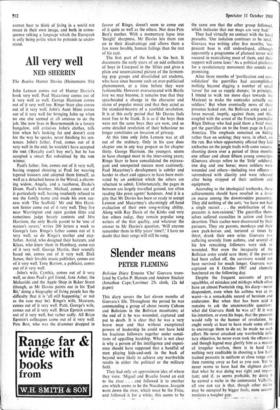Slender means
PETER FLEMING
Bolivian Diary Ernesto `Che' Guevara trans- lated by Carlos P. Hansen and Andrew Sinclair (Jonathan Cape /Lorrimer 25s cloth, 12s .6c1 paper) This diary covers the last eleven months of Guevara's life. Throughout the period he was commanding a group of about twenty Cubans and Bolivians in the Bolivian mountains; at the end of it he was wounded, captured and put to death. It is clear that he was a very brave man and that without exceptional powers of leadership he could not have held his fractious followers together under condi- tions of appalling hardship. What is not clear is why a person of his intelligence and experi- ence should have supposed that a handful of men playing hide-and-seek in the back of beyond were likely to achieve any worthwhile results in either the political or the military field.
They had only an approximate idea of where they were. 'Miguel and Braulio found an exit to the river . . . and followed it to another one which seems to be the Nacahuasu. Joaquin went down the river, which must be the Frias, and followed it for a while; this seems to be the same one that the other group followed, which indicates that our maps are very bad.'
They had virtually no contact with the local peasants. 'Our isolation continues to be total,' Guevara was writing after five months; 'our peasant base is still undeveloped, although apparently a programme of planned terror will succeed in neutralising most of them, and their support will come later.' As a political platform for a revolutionary movement this sounds un- promising.
After three months of 'purification and con- solidation' the guerrillas had accomplished nothing beyond digging a number of small `caves' for use as- supply dumps; 'in principle, I intend to walk ten more days towards the Masicuri to make the comrades actually see soldiers.' But when eventually news of their presence leaked out, the Bolivian army and air force moved, ineptly, against them, and this, coupled with the arrest of the French journalist Regis Debray who had paid them a brief visit, got the guerrillas on to the front page in Latin America. The emphasis remained on hiding rather than on seeking; ;they were, in effect, on the run. But when opportunity offered they laid ambushes on the jungle trails with some success, shooting down over a period of three months one officer and about fifteen -young conscripts (Guevara always refers to the 'little' soldiers), one dog and one horse; more soldiers were wounded and others—including two officers— surrendered with alacrity and were released after being stripped of their uniform and equipment.
According to the ideological textbooks, these achievements should have resulted in a levee en masse among the downtrodden peasantry.
They did nothing of the sort; 'we have not had a single recruit . . . the mobilisation of the peasants is non-existent.' The guerrillas them- selves suffered casualties in action and from desertion. Their caches were discovered by their pursuers. They ate parrots, monkeys and their own pack-horses and, tortured at times by thirst, drank their own urine. Guevara was suffering severely from asthma, and several of his few remaining followers were sick or wounded. Not even the incapacity of the Bolivian army could save them; if the pursuit had been called off, the survivors would not have survived for much longer. Guevara was captured on 8 October 1967 and clumsily butchered on the following day.
Despite the frequent accounts of petty squabbles, of mistakes and mishaps which often have an almost Pooterish ring, his diary—never despondent, even when his asthma was at its worst—is a remarkable record of heroism and endurance. But when that has been said it remains to ask the unanswerable question: what did Guevara think he was at? If it was his intention, or even his hope, that the peasants would rally to the banner of revolution, he ought surely at least to have made some effort to encourage them to do so; he made no such effort. He never attacked any worthwhile mili- tary objective, he never even took the offensive; and though legend may glorify him as a master of irregular warfare, there is in hard fact nothing very creditable in shooting a few half- trained peasants in uniform at close range and then running away as fast as you can. Yet he never seems to have had the slightest doubt that what he was doing was right and impor- tant; and if, as seems probable, by doing it he earned a niche in the communist Valhalla, all one can say is that, though other niches may be occupied by bigger fools, none accom- modates a tougher guy.






































 Previous page
Previous page